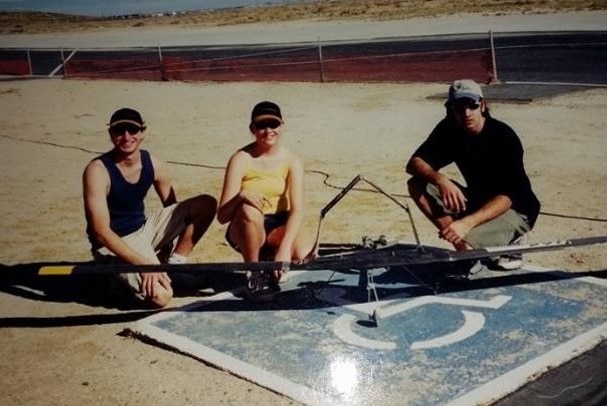2021/07/29
Job ready university degrees may not be the tertiary education solution we are hoping for - ABC News
Job ready university degrees may not be the tertiary education solution we are hoping for - ABC News
Job ready university degrees may not be the tertiary education solution we are hoping for
By Rosemary Barnes
Posted Wed 23 Sep 2020 at 4:30amWednesday 23 Sep 2020 at 4:30am, updated Wed 23 Sep 2020 at 7:14amWednesday 23 Sep 2020 at 7:14am
 Rosemary Barnes inspecting a wind turbine in northern Sweden.(
Rosemary Barnes inspecting a wind turbine in northern Sweden.(
Supplied)
Share
In 2005 I graduated from university with a combined degree in engineering and arts, majoring in philosophy.
Now, with 15 years of experience as a professional engineer specialising in wind turbine technology, I can look back and compare the practicality and "job relevance" of my two tertiary qualifications.
My grade average was almost exactly the same in both courses, and while I would not say that one was easier than the other, they were certainly very different.
Engineering grades seemed to be almost directly related to the number of hours spent studying and doing assignments: 10 hours' study might get you a pass, 20 a credit, 30 a distinction, for example.
 Rosemary Barnes (centre) says her grades in engineering were strongly related to the number of hours she spent studying while her marks in arts were dependent on the quality of her ideas.(
Rosemary Barnes (centre) says her grades in engineering were strongly related to the number of hours she spent studying while her marks in arts were dependent on the quality of her ideas.(
Supplied)
Yes, there was some variation between courses depending on how naturally the content came to me. Distinctions in mechanics of materials took me less study time than in software engineering.
With arts subjects, however, there was no such relationship between hours spent and grade achieved.
Rather, how well I did in each course was dependent on having a good idea, and whether or not such an idea came to me seemed quite random. Without a good and original idea, it was nearly impossible to get better than a credit no matter how many hours I spent rewriting my essays.
Skills and concepts
There were other differences.
My arts degree focused on core theoretical concepts and skills and very little on the kind of specific tasks you might expect to perform in a job.
Humanities students to pay entire cost of their degrees

Education Minister Dan Tehan says the Government want to steer people away from humanities into "job-ready" STEM fields.Read more
As an arts student, I gained critical thinking and logic skills, and practised applying them to a variety of issues until they were deeply embedded in the way I now interpret and interact with the world.
In engineering, the focus was partly on learning core concepts, like physics and maths, but with an important second focus on the idea of "job readiness". I learnt actual tasks that we could be expected to use in a future job.
Job readiness was emphasised more and more as I progressed through my five years at university.
 Rosemary Barnes is an expert in wind turbine technology — a field that was still developing when she was at university.(
Rosemary Barnes is an expert in wind turbine technology — a field that was still developing when she was at university.(
Supplied)
Technical fields move quickly
The interesting thing about the "job readiness" skills I learned at university is that these are the skills that quickly became outdated in technical professions such as engineering.
Fifteen years after graduation, the job-ready material that I learnt in my degree is no longer relevant.
The programs (for example, the computer-aided design or CAD program I learnt) and even types of structural analysis have evolved beyond recognition. The computer language I learnt to code in, project management methods, manufacturing methods — in fact nearly every practical example — were laughably out of date with five years of graduation.
The real cost of being a university student

University life has always been somewhat synonymous with poverty. But students and social workers say things have gotten much worse, forcing some to abandon their studies.Read more
Technical fields like engineering move quickly and as a professional you need to be able to learn and adapt quickly if you are to keep up to date. Many important fields that I have become expert in now did not exist when I was at university.
But because I learnt how to learn, and I have a good theoretical basis in physics and maths, for example, I am able to keep up to date with my fast-moving field.
I believe another issue is crucial: industry doesn't necessarily know what it needs, and especially what will be needed in the future.
Along with many other new graduates, I was criticised for my lack of job-readiness in my first few years at work.
Some of these criticisms were that my generation was not willing to do menial tasks, that I could not hand draft (even though that skill was not required), or that I didn’t know a specific CAD program used by my company (I learnt it in a week).
Adding more job readiness skills to university courses will reduce the amount of time that can be spent on the important theoretical building blocks, leading to perverse outcomes within a few years of graduates leaving university.
Their technical skills will become outdated very fast if they have focused on learning specific skills at the expense of a rigorous theoretical foundation.
 A few years after graduating from university Rosemary Barnes's engineering knowledge was being replaced by new advances.(
A few years after graduating from university Rosemary Barnes's engineering knowledge was being replaced by new advances.(
ABC News: Danielle Bonica)
The humble arts degree punches above its weight
So what about my arts degree?
By contrast, it has not dated much at all.
There have certainly been changes in the way topics like feminism and race are discussed. But the main skills you learn in a humanities degree are timeless: critical reading, critical thinking, communication of complex ideas, and most importantly (in my opinion) logical reasoning.
These skills have made me a far better engineer than I would have been without them, and I expect the same is true for most others with an arts degree, no matter which field they enter.
It may not be a straightforward ticket to employment — like an engineering degree — but wherever graduates end up, they are almost guaranteed to do a better job than they would without that intellectual training.
For these reasons, we need to be careful which courses we encourage students to take on, and we especially need to rethink giving degrees aimed at "job readiness" preferential treatment in relation to student fees.
The Australian Government has proposed a university education funding policy that would see the cost of degrees for "job-relevant" courses such as engineering, maths and nursing decrease while the cost of degrees such as humanities (implicitly not "job-relevant") will increase.
It is not so easy to anticipate what is ahead of us. If students don't get a strong education in theoretical basics they will not be as prepared to adapt to the future when it turns out to be different from what today's politicians imagine it will be.
Posted 23 Sep 202023 Sep 2020, updated 23 Sep 2020
Job ready university degrees may not be the tertiary education solution we are hoping for
By Rosemary Barnes
Posted Wed 23 Sep 2020 at 4:30amWednesday 23 Sep 2020 at 4:30am, updated Wed 23 Sep 2020 at 7:14amWednesday 23 Sep 2020 at 7:14am
Supplied)
Share
In 2005 I graduated from university with a combined degree in engineering and arts, majoring in philosophy.
Now, with 15 years of experience as a professional engineer specialising in wind turbine technology, I can look back and compare the practicality and "job relevance" of my two tertiary qualifications.
My grade average was almost exactly the same in both courses, and while I would not say that one was easier than the other, they were certainly very different.
Engineering grades seemed to be almost directly related to the number of hours spent studying and doing assignments: 10 hours' study might get you a pass, 20 a credit, 30 a distinction, for example.
Supplied)
Yes, there was some variation between courses depending on how naturally the content came to me. Distinctions in mechanics of materials took me less study time than in software engineering.
With arts subjects, however, there was no such relationship between hours spent and grade achieved.
Rather, how well I did in each course was dependent on having a good idea, and whether or not such an idea came to me seemed quite random. Without a good and original idea, it was nearly impossible to get better than a credit no matter how many hours I spent rewriting my essays.
Skills and concepts
There were other differences.
My arts degree focused on core theoretical concepts and skills and very little on the kind of specific tasks you might expect to perform in a job.
Humanities students to pay entire cost of their degrees
Education Minister Dan Tehan says the Government want to steer people away from humanities into "job-ready" STEM fields.Read more
As an arts student, I gained critical thinking and logic skills, and practised applying them to a variety of issues until they were deeply embedded in the way I now interpret and interact with the world.
In engineering, the focus was partly on learning core concepts, like physics and maths, but with an important second focus on the idea of "job readiness". I learnt actual tasks that we could be expected to use in a future job.
Job readiness was emphasised more and more as I progressed through my five years at university.
Supplied)
Technical fields move quickly
The interesting thing about the "job readiness" skills I learned at university is that these are the skills that quickly became outdated in technical professions such as engineering.
Fifteen years after graduation, the job-ready material that I learnt in my degree is no longer relevant.
The programs (for example, the computer-aided design or CAD program I learnt) and even types of structural analysis have evolved beyond recognition. The computer language I learnt to code in, project management methods, manufacturing methods — in fact nearly every practical example — were laughably out of date with five years of graduation.
The real cost of being a university student
University life has always been somewhat synonymous with poverty. But students and social workers say things have gotten much worse, forcing some to abandon their studies.Read more
Technical fields like engineering move quickly and as a professional you need to be able to learn and adapt quickly if you are to keep up to date. Many important fields that I have become expert in now did not exist when I was at university.
But because I learnt how to learn, and I have a good theoretical basis in physics and maths, for example, I am able to keep up to date with my fast-moving field.
I believe another issue is crucial: industry doesn't necessarily know what it needs, and especially what will be needed in the future.
Along with many other new graduates, I was criticised for my lack of job-readiness in my first few years at work.
Some of these criticisms were that my generation was not willing to do menial tasks, that I could not hand draft (even though that skill was not required), or that I didn’t know a specific CAD program used by my company (I learnt it in a week).
Adding more job readiness skills to university courses will reduce the amount of time that can be spent on the important theoretical building blocks, leading to perverse outcomes within a few years of graduates leaving university.
Their technical skills will become outdated very fast if they have focused on learning specific skills at the expense of a rigorous theoretical foundation.
ABC News: Danielle Bonica)
The humble arts degree punches above its weight
So what about my arts degree?
By contrast, it has not dated much at all.
There have certainly been changes in the way topics like feminism and race are discussed. But the main skills you learn in a humanities degree are timeless: critical reading, critical thinking, communication of complex ideas, and most importantly (in my opinion) logical reasoning.
These skills have made me a far better engineer than I would have been without them, and I expect the same is true for most others with an arts degree, no matter which field they enter.
It may not be a straightforward ticket to employment — like an engineering degree — but wherever graduates end up, they are almost guaranteed to do a better job than they would without that intellectual training.
For these reasons, we need to be careful which courses we encourage students to take on, and we especially need to rethink giving degrees aimed at "job readiness" preferential treatment in relation to student fees.
The Australian Government has proposed a university education funding policy that would see the cost of degrees for "job-relevant" courses such as engineering, maths and nursing decrease while the cost of degrees such as humanities (implicitly not "job-relevant") will increase.
It is not so easy to anticipate what is ahead of us. If students don't get a strong education in theoretical basics they will not be as prepared to adapt to the future when it turns out to be different from what today's politicians imagine it will be.
Posted 23 Sep 202023 Sep 2020, updated 23 Sep 2020
Related Stories
Namgok Lee 예수의 깨달음의 핵심 - 본인이 '사람의 아들'이라는 것
(3) Facebook
Namgok Lee
5 h ·
어제 폭염이었지만, 선풍기도 필요없을 정도로 시원한 한낮의 고운동에서 강영구 신부님과 대화를 나누었다.
세균과 바이러스와의 싸움에서 인간이 이길 수 있을까?
그것을 극복하는 길이 사회적 거리두기와 백신 같은 기능적 방법으로 가능할까?
극복의 길은 결국 사랑ㆍ양보ㆍ겸손의 길이라는 강 신부님의 이야기에 동의하면서, 나는 각자도생의 차가운 거리두기로는 자칫 생태파시즘 앞에 스스로를 노출할 수 있다는 위험을 지적하였다.
우리의 민주주의 안에 이웃에 대한 사랑과 배려의 의식과 단순소박한 삶 속에서 행복을 찾는 행복관의 변화가 그 내용으로 담겨야 한다는 생각들을 나누었다.
예수의 출가와 광야에서의 40일 간의 수행과 깨달음 그리고 하산, 12제자와의 만남과 복음 선포 등을 석가의 그것과 비교하며 그 근본이 회통한다는 강 신부님의 이야기가 신선했다.
특히 예수의 깨달음의 핵심이 본인이 '사람의 아들'이라는 것이었다는 말씀을 하시면서, 이문열의 소설 '사람의 아들'을 화제 삼아, 두 길의 선택에 대한 사제로서의 진솔한 고뇌를 말씀하셔서 감동을 받았다.
두 길, '상선벌악(선은 상주고 악은 벌한다)'과 '동체자비'의 길에서 결국 어디에 설 것인가라는 선택 앞에 사람의 아들이 직면할 수 밖에 없는 것이다.
때로는 백척간두에 몸을 던지는 결단일 수 있다.
나는 현실적으로 '미움과 분노에 휘둘리지 않고 정의를 실현할 수 있는가?'라는 인류사의 진보를 향한 질문과 이 두 길 사이의 선택이 이어진다고 생각한다.
'미움과 분노 없이'라는 것은 인간의 현실에서 너무 거리가 멀게 느껴지지만, 적어도 '휘둘리지 않고' 정도는 목표로 삼아야 지금의 난국과 위기를 넘어 새로운 전환을 이룰 수 있지 않을까?
나는 논어에 나오는 이야기를 소개했다.
'인자라야 능히 미워할 수 있고, 진실로 인을 구하면 미움이 없다'
라는 내 해석을 말했는데, 보통 해설서들은 '진실로 인을 구하면 악함이 없다'라고 번역을 한다.
미움과 악함이 한자가 같기 때문이지만, 문득 인이 궁극적으로 추구하는 길도 '상선벌악'의 길이 아닌 '동체자비'의 길이라는 생각이 들었다.
그런 의미라면 '악이 없다"라는 번역도 새로운 의미로 다가온다.
그리고 마지막은 최치원 선생의 피리 대신 강 신부님의 플륫 연주를 들었다.
영화 미션의 주제가 였다는 넬라판타지아였다.
뜻깊은 피서였다.
모두에게 감사드리며, 고운동의 새벽.
Labels:
Namgok Lee
Subscribe to:
Posts (Atom)








